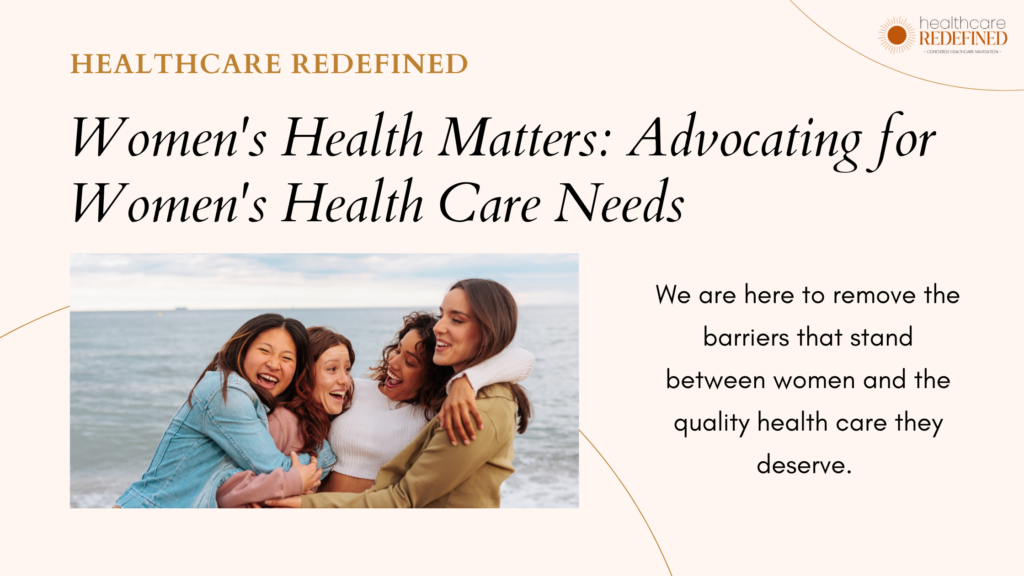Women face serious challenges across the healthcare spectrum. Their health issues are often ignored or treated as less important, and most of these issues are caused by biases or neglect.
According to the Morbidity and Mortality Weekly Report (MMWR) and the Office on Women’s Health, 22 percent of women experience chronic pain, and one in every five women suffer mental health concerns. Even in the past, there hasn’t been enough focus or research on women’s health. This has resulted in substantial knowledge gaps and misinformed practices, failing to fully cater to women’s needs.
But increasing significant awareness and advocating for women’s health care can largely contribute to better care for women across the globe. Here’s why women’s health matters as equally as men and let’s understand how advocates for women’s health can help.

Understanding Women’s Health Challenges
The alarming barriers that women face often prevent them from receiving timely and appropriate care that they need. It further complicates their health journeys. Plus, delayed diagnoses, dismissed symptoms and racial biases make navigating the complexities of women’s health even more challenging.
Striving to be Heard
Many women often face the issue of being unheard or overlooked in the first place. Their symptoms are downplayed or dismissed as stress, which leads to undiagnosed conditions. This difficulty in not being heard comes from a healthcare system that has traditionally focused on research and views based on men.
For women of color, it is beyond a challenge due to additional racial biases that further limit their access to quality care.
Delayed Diagnoses and Inadequate Treatment
The path to a correct treatment is often longer for women than men. Their journey is fraught with missteps and oversights. Additionally, women’s health needs have often faced unnecessary delays because their concerns are not treated with the same urgency as men’s.
Conditions like heart attack are often misinterpreted as they show up differently in women. The worst part is that some diseases, such as autoimmune diseases, which are common in women, can be hard to diagnose and may take years and several doctors to identify.
Influence of Bias and Stigma
Some stigmas and biases have created significant barriers for women from receiving effective treatments. For example, weight stigma often leads to quick judgments and oversimplified health advice that ignore the unique needs of each person. This results in an incomplete examination of health issues and missing chances for early treatment.
Also, there is less knowledge about how diseases affect women differently because women have been left out of much clinical research in the past. Tackling these biases is not just about fairness. But it is more about ensuring that everyone has the right to quality healthcare, no matter their gender, race, or body size.
The Problem with Traditional Healthcare Care Models
While women face challenges like having their voices ignored, the limitations of traditional healthcare models make it even harder for them to receive the care they need. These models can be impersonal, rushed, and disjointed, and leave patients feeling ignored and underserved.
Traditional healthcare models often don’t meet the unique needs of women. The healthcare system needs to evolve to provide more inclusive and equitable care, offering women a voice in their treatment plans and greater access to specialized care. But obviously, we can’t wait until the system gets treated. And that’s where advocates for women’s health play a critical role, especially in light of these challenges.
Women continue to face disparities in healthcare access and treatment. This results in worse health outcomes. With increasing awareness of conditions that disproportionately affect women, such as autoimmune diseases, reproductive health issues, and mental health concerns, women’s health advocates ensure that women’s voices are heard and their needs are addressed.
Moreover, by advocating for women’s health, we can promote better health outcomes, ensure that women’s unique needs are recognized, and ultimately create a more responsive and compassionate healthcare system.
The Need of Advocates for Women’s Health
Women’s health advocates are really important these days to ensure their overall well-being. Various reasons suggest the urgent need of advocates for their better health.
Make Your Voice Heard
Regardless of working or housewives, women often forget to take control of their own health while taking care of their family members. It is far beyond just important that they should be actively checking on their health to ensure everything is fine with them.
When you have health advocacy services experts by your side, they make your voice heard. They not only take care of your regular check-ups and appointments but also coordinate with specialists and take all necessary steps to help you stay healthy and happy.
Navigating Health Information
In today’s digital era, the sheer volume of information available is indeed overwhelming and not so helpful. Additionally, it is not a cup of tea for normal people to be able to tell the difference between reliable information and false or misleading information that are available on the internet.
Having the right information about your health, regardless of who you are and how healthy you look, is crucial. A trusted women’s health advocate can help translate complex information and guide you in making informed decisions.
Prioritize Routine Care for Better Health
A lot of people in the world don’t go for screening, believing that their ancestors didn’t have any major health concerns, so they are also less likely to develop chronic illnesses. But it is not true. Nobody is immune to any kind of disease, and that’s why routine care should be a priority.
Experts from top-rated hospitals in NY and around the world suggest that routine healthcare can detect potential problems before they become more serious. It is a key component of preventive health, helping you prevent issues or receive early diagnoses.
Take Charge of Your Health Journey
Just as you take care of your family, taking care + control of your health is equally important. It’s not a skill that you need to take courses for, but you must know how to speak for yourself, ask the right questions, get second opinions from expert advocates for women’s health, and be able to communicate well with your healthcare providers.
If you don’t feel confident enough to advocate for yourself, are unable to make decisions or prioritize your health, are not getting the treatment you need, or need assistance to ensure your physical, mental, and emotional well-being, you should definitely consult with a professional healthcare advocate.
Take the Final Step
Women’s health isn’t a concern limited to them. It’s a concern for all of us, as it impacts society as a whole. And creating a better healthcare system for women requires everyone’s involvement. We must take the necessary steps, such as raising awareness and advocating for change to achieve this. When women’s health receives the attention they deserve, we can expect better healthcare outcomes for all.
At Healthcare Redefined, we are here to remove the barriers that stand between women and the quality health care they deserve. Our top-rated and trusted women’s health advocacy services in New York City and New Jersey ensure easier access to healthcare and promote closer communication between patients and their providers at top-rated hospitals in NYC and New Jersey.
Contact us today for more information or book an appointment to discuss your healthcare needs.
January 23, 2025

You need a guide who has been through the trenches and understands the healthcare system inside and out. That's where I come in. I'm Nicoletta – a Board Certified Patient Advocate here to help you feel confident and empowered in your healthcare journey.